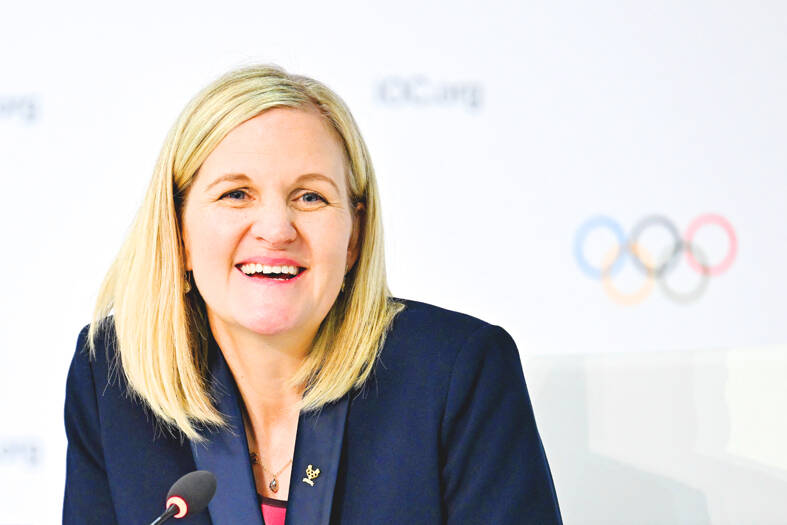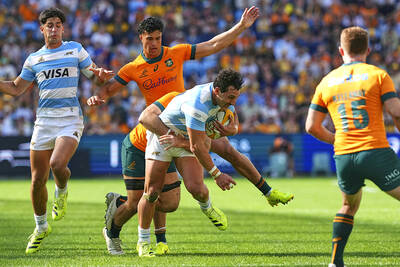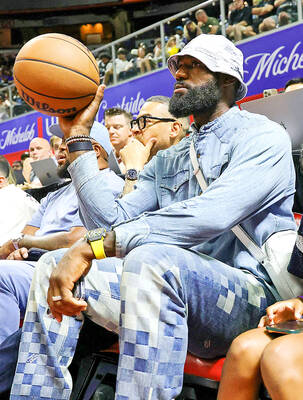Kirsty Coventry became the first woman and first African to be elected president of the International Olympic Committee (IOC) on Thursday and set her sights on confronting the dual unpredictability of geopolitical intrigue and US President Donald Trump.
The 41-year-old two-time Olympic swimming champion from Zimbabwe is the youngest person to hold the most powerful position in sports governance.
“This is an extraordinary moment,” said Coventry, who is minister of youth, sport, arts and recreation in her native Zimbabwe.

Photo: AFP
“As a nine-year-old girl I never thought that I would be standing up here one day, getting to give back to this incredible movement of ours,” she said.
Coventry faces enormous challenges, such as dealing with Trump in the run-up to Los Angeles hosting the 2028 Summer Games.
She said “communication will be key” with the US leader.
“I have been dealing with, let’s say, difficult men in high positions since I was 20 years old,” said Coventry, who said she is confident Trump would put all his weight behind the staging of the 2028 showpiece.
“My firm belief is that President Trump is a huge lover of sports, he will want these Games to be significant, he will want them to be a success,” she said.
Coventry added that on the thorny issue of transgender athletes — Trump has said there are only two genders, male and female — the IOC would stand its ground.
“So in terms of Donald Trump, again, it’s going to take communication. As I just said, we’re going to create a task force that’s going to look at the transgender issue and the protection of the female category,” she said.
She said a decision would be made “collectively” with the international federations. “That decision will be made very clear and we won’t move from that decision.”
RUSSIA
Another major issue on her agenda is the question of whether to allow Russia to return to the Olympic fold. In Paris last year Russian athletes had to compete under a neutral banner, after Russia’s 2022 invasion of Ukraine.
Russian President Vladimir Putin congratulated Coventry on her election, saying it was “proof of your high authority in the sporting world,” while Russian Minister of Sport Mikhail Degtyaryov on Telegram said he hoped it would lead “to Russia returning to the Olympic podium.”
Coventry was thought to be in a tight-run race with IOC vice president Juan Antonio Samaranch Junior and World Athletics president Sebastian Coe for the top job.
However, to general surprise, the race was decided in the first round of voting.
Coventry received 49 of the 97 votes possible, with Samaranch obtaining 28 and Coe third with a humbling eight votes.
THOMAS BACH
Coventry’s victory came despite a manifesto that was widely seen as bland, and a campaign that started slowly. However, in the final few days before the secret ballot, strong lobbying from outgoing IOC president Thomas Bach and other senior IOC members proved to be crucial in tipping support her way.
Beforehand Coe was widely accepted to have the best CV, having won two Olympic gold medals, run the London 2012 Games and having been World Athletics president since 2015.
He had hoped to get votes by positioning himself as the change candidate, who would make the IOC more democratic and also protect women’s sports.
However, his strategy to get the backing of a majority of former athletes before winning a majority in the later rounds when other candidates dropped out was blown away.
Coe’s chances were hindered by becoming an implacable enemy of Bach when World Athletics banned all Russian athletes from the Rio 2016 Olympics for state-sponsored doping.
However, there was probably little any candidate could have done given Bach’s power and influence over the organization he has run since 2013, during which time he has appointed more than two-thirds of the electorate.
The 71-year-old German, who was voted in as honorary president on Wednesday, would continue to wield significant influence even if he denied having a direct involvement in Coventry’s victory afterwards.
HUMAN RIGHTS
However, while many would rejoice at the first woman to lead the IOC, Coventry’s election victory would be seen as controversial in some quarters — largely due to her role in Zimbabwe’s government, which remains under international sanctions from countries including the US, the UK and the EU over alleged human rights abuses and the erosion of democratic institutions.
Human Rights Watch, an international non-governmental organization that conducts research and advocacy on human rights issues worldwide, said that the 2023 election of Zimbabwean President Emerson Mnangagwa was “characterized by repression of civil and political rights.”
“Southern African Development Community observers and others found that the election failed to meet regional and international standards for free and fair elections,” it said.
“Following the elections, abductions, arbitrary detention and torture of parliament members, opposition political activists and human rights defenders escalated. Since then, the government has repeatedly targeted opposition members and activists, holding them in prolonged detention, mistreating them in custody, and weaponizing the judicial system against rights defenders,” it added.
Coventry is to take over when Bach formally leaves office on June 23, having reached the maximum 12 years in office.
Additional reporting by staff writer

‘DEVASTATED’: Argentina’s win was a reversal of their 28-24 defeat last week, with Australian forward Fraser McReight adding that ‘we did the same thing last week’ Argentina flyhalf Santiago Carreras punished an undisciplined Australia with 23 points off the tee as the Pumas held on grimly for a 28-26 win in Sydney yesterday to breathe new life into their Rugby Championship campaign. A try-fest beckoned in afternoon sunshine at Sydney Football Stadium, but Argentina needed only one through captain Julian Montoya, with Carreras doing the damage with seven penalties and a conversion in front of a sell-out crowd. A week after letting a 14-point lead slip in a 28-24 defeat to Australia in Townsville, Argentina saw most of a 21-point advantage erased in the final quarter as the

Captain Vijay Kumar led the way yesterday as the Hsinchu Titans claimed the Taiwan Premier League title at the Yingfeng Cricket Ground in Taipei’s Songshan District (松山), beating PCCT by 27 runs. The weather was a topic again, but not the rain that played a role in previous matches in the often-delayed tournament. Kumar, who made 80 not out from 63 deliveries, and teammate Vishwajit Kumar (58 from 43) rescued the Titans from a precarious state at the end of the power play in the T20 match. The visitors were put in to bat and struggled to 26-3 as PCCT

China’s state-run People’s Daily newspaper on Monday published an essay about Chinese basketball it said was written by LeBron James, but a representative for the NBA star said on Thursday that the article was based on a series of interviews. The paper, better known as the mouthpiece of the Chinese Communist Party, had said James authored the essay, “Basketball is a Bridge that Connects Us,” a tribute to Chinese players and fans of the sport written in the first person. “LeBron James Pens an Article in the People’s Daily,” read a post published on the newspaper’s official WeChat account. On Thursday, a representative

San Francisco Giants pitcher Teng Kai-wei impressed against the Arizona Diamondbacks on Monday despite an 8-1 loss in the opener of the team’s nine-game road trip. Teng, the only Taiwanese pitcher active in MLB, struck out five while allowing two hits and one walk over four innings at Chase Field to finish with a no decision, as the teams were tied 1-1 when he finished his outing. He surrendered the lone run of his outing in the bottom of the first, which began with a walk, a hit-by-pitch and two strikeouts. Diamondbacks leadoff hitter Geraldo Perdomo advanced to third on